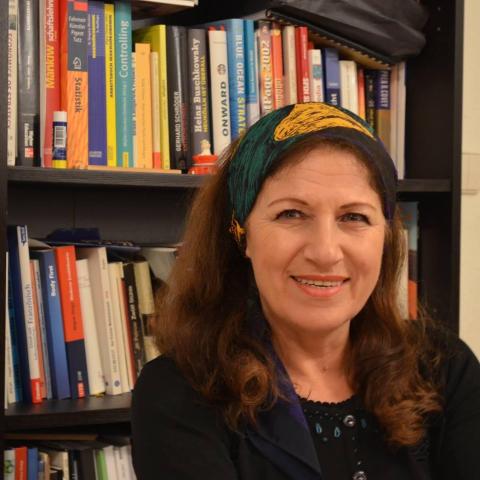Interview with longlisted author Sausan Jamil Hasan
17/02/2025

When did you begin writing Heiress of the Keys and where did the inspiration for it come from?
The idea of the novel began to occupy me in late 2020, when the collapse of Syrian society was becoming. The repercussions spread across all areas of life, eventually fracturing the family. I had long expected this to happen. I lived in Syria most of my life and was in direct contact with all forms of oppression and repression – whether political, religious or social – and the rampant administrative, social, educational and judicial corruption. Values and intellectual systems were eroding, and society was losing its identity, shrinking to fit into narrow molds that prevented it from developing. This pained me and exacerbated my anxiety about the future of the country, particularly as I felt the crises in people’s lives primarily through my profession as a doctor. Patients were exposed in front of me, physically, psychologically, and cognitively. I touched the depths of their souls and felt their pains and spiritual crises. I was very preoccupied with the disintegration of the family. Women in general have not been absent from any of my previous works. I had portrayed them in many characters, most of which are related to society and its view of them and their professional, social, and legal status. In this novel, I focused on a woman’s relationship to her body, what beauty means to her, and how she deals with it when it is not associated with her self-awareness as a person with dignity and her own identity. Like Radya in Heiress of the Keys, whom I allowed to live her life without imposing preconceived values upon her. But I did not finish writing until two years later.
Did the novel take long to write and where were you when you finished it?
As I said, I started it, then stopped for a period of time before resuming. I was living in Berlin, where I still live. But I never stopped following events in Syria. The novel follows the life of a Syrian family that came to be in the mid-1970s. this means that it was trying to understand the conditions that brought the country to where it is. Social changes were happening one after the other, perhaps without everyone noticing. But they did indeed affect the structure of society because when the country slid into war, the social structure’s fragility became apparent.
Do you have writing rituals?
Actually, I do not have what can be considered writing rituals. In my exile, I am governed by different life circumstances than in my country but I can say that I prefer writing in the morning, and writing directly on the laptop. I only wrote my first novel Silk of Darkness on paper. Sometimes I am upset that the familiarity between me and paper has gone cold – this is one aspect of the digital invasion of our lives. I justify this to myself that there are many inventions that were revolutionary at the time but were met with suspicion at first or not readily accepted in general. This is what happened with the printing press, the steam locomotive, the airplane, and more. But ultimately, they have become pillars of our contemporary life.
What is your next literary project after this novel?
Writing is a project for the writer. It may not be subject to a timeline and plan. I speak for myself. I do not set specific timelines for my work. When the moment of writing arrives, I start. Thus, today I have many writing ideas. I have not started a new novel yet. But I guess that I am about to begin.
